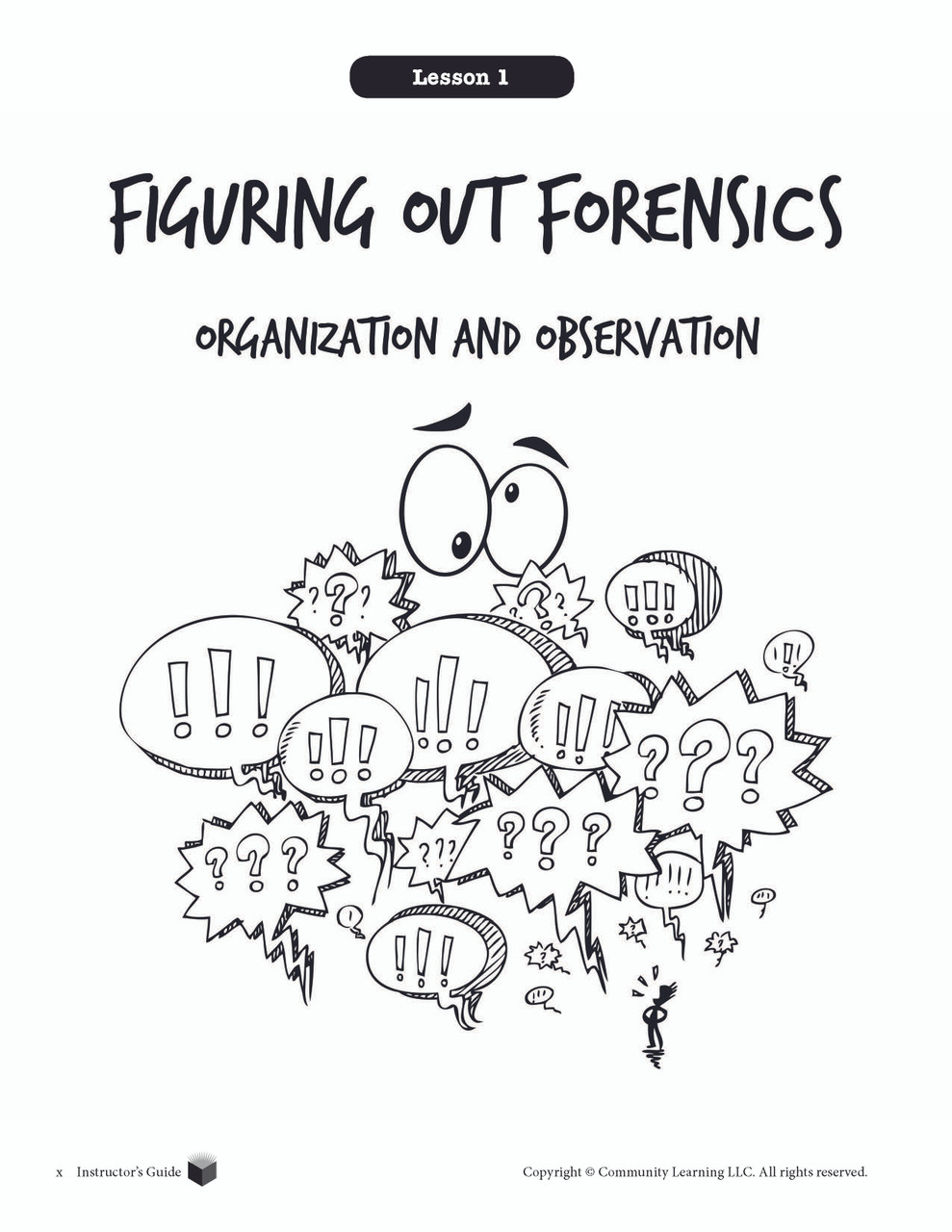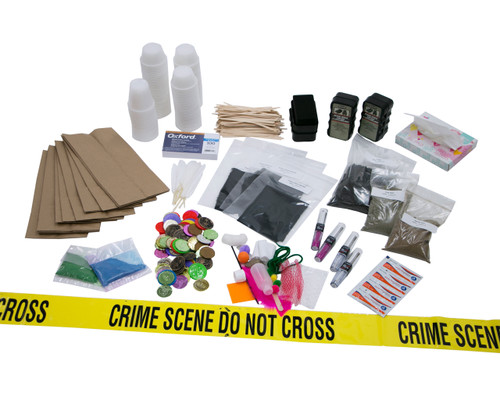













Missing Money Mystery: An Introduction to Forensic Science Summer Camp Kit
Community Learning
- SKU:
- MMM800-SC
- Shipping:
- Calculated at Checkout
- Grades:
- 2-3
- Contact Hours:
- 12-15
- Group Size:
- 2-4
This fun, interactive learning program immerses students in grades 2-3 into a scientific discovery as they work to solve the mystery of the stolen funds. Kids will test their CSI skills as they work the case and discover the guilty party!
Crime Scenario
The Missing Money Mystery is based on the premise that a crime occurred in Mr. Mugg’s fourth grade classroom at Markwell Elementary. A canister holding the money for an upcoming geocaching field trip disappeared sometime after dismissal on a Monday afternoon. Mr. Mugg knows his students have been looking forward to this special trip which will introduce them to the natural world through a real-life treasure hunt, so he decides to undertake the investigation himself—with the help of your students.
Course Outline
The Missing Money Mystery is comprised of 12 lessons, designed each to take approximately 1-hour, for a class of 30 students.
Lesson 1: Figuring Out Forensics - Organization and Observation: A mysterious "bag of stuff" and some peculiar foreign coins launch learners on the trail of a fugitive from justice. Explore the power of description in this exciting introductory lesson.
Lesson 2: Securing the Scene – Collecting Evidence: Wrongdoers, beware! Learners visit the scene of the crime and use real forensic techniques (such as triangulation) to begin the search for trace evidence that will point to a thief!
Lesson 3: Powder Power - Solutions or Suspensions? Don’t let our sneaky cash-snatcher getaway! The plot thickens (and so do some solutions—or are they suspensions?) as students experiment with different mysterious white powders.
Lesson 4: Natural or Not - Fiber Identification: Weave together the threads of a crime in an activity that allows learners to practice a proven technique in forensic fiber analysis. Then put on your deerstalker and set your Sherlockian sights on classifying the evidence. It's elementary, dear Watson!
Lesson 5: Tracking the Tires - Tread Patterns: The plot thickens as Mr. Muggs asks his students to examine the strange pattern of tire tread evidence discovered outside his window. Can you figure out who rode the getaway bicycle?
Lesson 6: Digging for Dirt - Soil Samples: Another form of trace evidence gets the "detective treatment" in this fascinating lesson, as learners explore the work of forensic geologists and sort through soil samples and chart their observations in their detective notebooks!
Lesson 7: Cast a Clue – Shoe Print Evidence: The guilty party had no idea what they had stepped in. Students analyze shoe prints left at the crime scene to determine if any of the suspects were there.
Lesson 8: Crack the Code - Cryptograms: It may not be quite as challenging as the DaVinci Code, but the coded message left on Mr. Mugg's desk just might point to a clever thief. Learners uncover many secrets of the alphabet (and of master criminals!) in this deciphering activity.
Lesson 9: Lifting Lips - Lip Prints: Does our crook have a crooked smile? Learners "lift," classify, and compare their own lip prints to unlock the patterns of this unique form of evidence.
Lesson 10: Proof in Profiling - DNA Identification: The case is nearly cracked when students compare strands of suspects' DNA and begin to close in on the real culprit. This authentic investigatory procedure explores genetic markers.
Lesson 11: Suspicious Statements: Means, Motive and Opportunity: Students take a careful look at the letters each suspect wrote in the beginning of the year to see any possible connections between their interests and the classroom crime.
Lesson 12: Case Closed: Analyzing the Evidence: Students test their analytical skills when all of the evidence is laid on the table—and will lead our detectives to point their collective fingers at the guilty party: mystery solved!
What's Included?
The Missing Money Mystery Summer Camp Kit contains an Instructor's Guide, a Teacher Resource Thumb Drive, pre-printed handouts, and all the essential items needed to teach a class of up to 30 students!
Every step is taken to provide an easy-to-follow format and informative, fun-to-read instructions for each lesson. In addition to a brief listing of objectives, materials, and set-up procedures, useful icons point the instructor to several key elements:
Notes for the Instructor: Brief instructor notes introduce the subject matter and challenges presented in the particular lesson. They often contain real-life, age-appropriate examples from crime in history or popular culture.
Notes for the Students: These notes “set the stage” for each lesson by presenting brief material to read, listen to, and discuss.
Vocabulary: New and relevant terms are defined here. Note, too, the comprehensive “Glossary” at the end of the Instructor’s Guide and Student Books.
Activity Description: Here, step-by-step procedures are provided for both the instructor’s demonstration and the student’s immersion in the activity.
Wrap-up: Discussion-provoking questions and summary-type activities are designed to revisit the day’s learning and help students investigate further.
Clean-up: Clear instruction on preserving and storing materials is provided to ensure kit longevity and cost-effectiveness.
Other Destinations: To extend lessons and deepen understanding across disciplinary and cultural divides, relevant links to multimedia, web resources, and fun at-home or extension activities are provided here.
Online Resources
Our online resources for the Missing Money Mystery includes all the copy masters for student handouts, activities, lesson extensions like crossword puzzles to reinforce newly learned used vocabulary, and learning aides. Links to forensic videos and other multimedia resources provide authentic lesson extensions and teacher tutorials for each hands-on activity, found here.
Supplies
Packed and labeled, each supply item and tool needed to solve the mystery is organized in a way that makes the course easy to teach again and again!
The Missing Money Mystery Summer Camp Kit Includes:
| 1 x Instructor’s Guide | 1 x Teacher Resource Thumb Drive |
| 1 x Pre-Printed Handout Bundle | 2 x Dusting Powder Packets |
| 80 x Envelopes | 1 x Modeling Clay Tub |
| 1 x Fabric Sample Set | 1 x Crime Scene Tape |
| 2 x 250 mL Beakers | 100 x Wooden Splints |
| 1 x Membership Card | 75 x Coins |
| 15 x Tweezers | 1 x Metal Tong |
| 1 x Package of Hand Wipes | 1 x Funnel |
| 15 x Textured Objects | 3 x Votive Candles |
| 10 x Bonus Objects | 1 x Aluminum Pan |
| 15 x Colorful Rulers | 1 x Shoe Polish Wipe Pack |
| 1 x Masking Tape Roll | 3 x Paint Brushes |
| 12 x Permanent Markers | 1 x Container of Loam |
| 1 x White Vinegar | 1 x Tire Sample |
| 15 x Hand Lenses | 1 x Box of Tissues |
| 3 x Scrub Brushes | 48 x Crayons |
| 15 x Brown Paper Bags | 1 x Tablespoon Measure |
| 20 x Dropper Bottles | 15 x Plastic Bath Cups |
| 1 x Cornstarch Tub | 1 x Package of Index Cards |
| 1 x Sandy Soil Tub | 36 x Pencils |
| 1 x Clay Soil Tub | 10 x Mirrors |
| 1 x Salt Tub | 16 x Rolls of Tape |
| 1 x Plaster of Paris Tub | 4 x Lipstick Set |
| 1 x Baking Soda Tub | 16 x Plastic Bags |
| 1 x Powdered Sugar Tub | 10 x Feathers |
| 1 x Sand Sample Bag | 12 x Student Scissors |
| 1 x Packing Tape | 1 x Hand Lotion |
| 10 x Measuring Tape | 25 x Paper Plates |
| 1 x Construction Paper Set | 200 x Portion Cups |

















